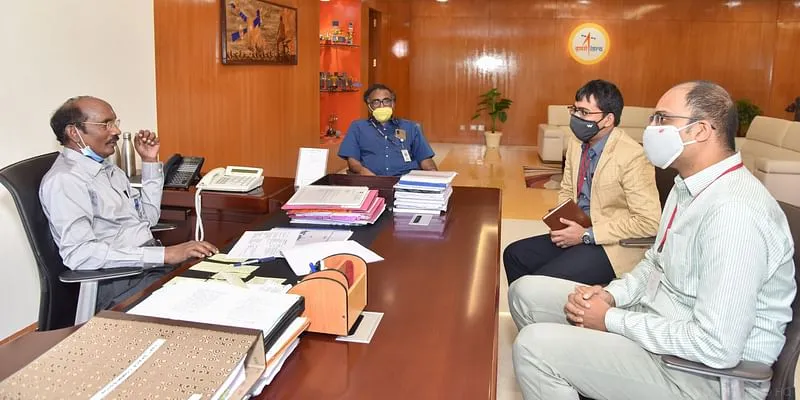Spacetech startup Skyroot Aerospace partners with DoS for ISRO facilities and technical expertise
Skyroot Aerospace will get access to facilities and technical expertise available in ISRO centres for its launch vehicle development programme.
Hyderabad-based spacetech startup Skyroot Aerospace has entered into a non-disclosure agreement (NDA) with the Department of Space (DoS). As a part of this deal, Skyroot will get access to facilities and technical expertise available in ISRO centres for its launch vehicle development programme.
Taking to Twitter, the spacetech startup said, “We formally signed up with ISRO. This is the beginning of a historic journey together. Our hardware will soon be rolled out to ISRO facilities for testing.”
Pawan Kumar Chandana and Naga Bharath Daka, former ISRO scientists, had launched Skyroot Aerospace to develop privately built space launch vehicles. The startup’s Vikram series — named after ISRO founder Dr Vikram Sarabhai — consists of three launch vehicles developed especially for launching small satellites.

Dr K Sivan, Secretary, DoS and Chairman at ISRO assured support to Skyroot for testing and qualifying their launch vehicle [Image Credit: ISRO]
Speaking with YourStory, Pawan explained that the startup has been interacting with IN-SPACe committee and ISRO teams and this move marks the formal starting point for taking this interaction to the next level.
“We get to use ISROs test and launch facilities and also benefit from their technical expertise. Our stages of Vikram-1 Launch vehicle will soon be moving to ISRO's facilities for testing,” he added.
This development comes a month after the startup announced a successful test firing of its solid propulsion rocket stage named Kalam-5. At that time, the startup also revealed that it is in the process of raising $15 million in funding in 2021.
Skyroot Aerospace has till date raised $4.3 million and counts Mukesh Bansal, Vedantu Investments, Solar Industries among others as its investors. It’s the first vehicle Vikram-I is under manufacturing and is expected to be launched in December 2021
Apart from Skyroot, Agnikul Cosmos had also entered into a non-disclosure agreement with the Department of Space (DoS) last year under the newly established Indian National Space Promotion and Authorisation Centre (IN-SPACe) entity. As a part of this agreement, the IIT-Madras incubated startup is working with ISRO to develop a launch vehicle.
The deal with Skyroot also comes 25 days ahead of ISRO’s special PSLV-C51 mission, which will carry Bengaluru-based satellite imaging startup Pixxel’s first satellite Anand from its Firefly fleet of Earth observation satellites.
Apart from this, it will also include two more satellites, 'SATISH SAT' by 'Space Kids India', and 'UNIT-SAT' by a consortium of universities. However, the primary payload of PSLV-C51 will be a Brazilian Earth observation satellite named Amazonia.
The DoS has been allocated Rs 13,949 crore in the Union Budget 2021, of which Rs 8,228 crore is earmarked for capital expenditure. New Space India Limited, a newly formed public sector undertaking under DoS, which will execute the launch of PSLV-C51 mission has been allocated Rs 700 crore.
According to a report by PwC, the Indian space economy is valued at $7 billion, and forms two percent of the global space economy. It needs to grow at an approximate rate of 48 percent CAGR over the next five years in order to reach its target of $50 billion.
The sector is now entering into a new era with public-private partnerships. With special missions such as PSLV-C51, Chandrayaan 3 and Gaganyaan scheduled this year, the Indian space sector is on its path to attain the goal.
Edited by Saheli Sen Gupta








